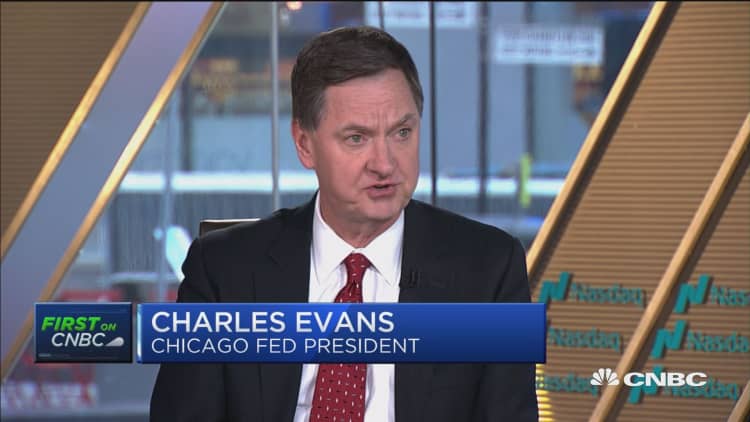
Chicago Federal Reserve President Charles Evans told CNBC on Friday he's still nervous about continued low inflation and would prefer to "wait a little longer" than this month's meeting before raising interest rates for the first time in 2018.
The financial markets, however, view a March rate increase as a virtual lock. Central bankers have projected three rate increases for 2018, the same as last year. Some economists even see four rate hikes this year.
"My own preference would be to wait a little bit longer, let the March anomalous inflation rate from a year ago fall out," said Evans, who is not a policy voting member this year but takes part in the meetings.
"Let's make sure these sort of Amazon, disruptive kind of pricing models aren't continuing to find their way into keeping inflation lower than that," he added in a "Squawk Box" interview.
By midyear, if inflation does show signs of increasing to the Fed's 2 percent target, Evans said, he would be "much more confident" to continue "a gradual upward adjustment of the funds rate." The fed funds rate — what banks charge each other for overnight loans — stands in a 1.25 to 1.50 percent range after the last Fed increase in December.
The trajectory of rates is much more important than whether there are "three, two, four rate increases" this year, Evans said.
Evans appeared on CNBC after the government reported a much stronger-than-expected 313,000 nonfarm jobs were added last month. The unemployment rate held steady at 4.1 percent. But average hourly earnings growth of 0.1 percent was lower than expected for February, representing a 2.6 percent advance on an annualized basis.
That strong wage number in January's jobs data had sparked fears of inflation and the Fed raising rates more aggressively than projected as a result. Those fears started the early February slide in the stock market, which plunged briefly into correction territory of more than 10 percent from the Jan. 26 all-time closing highs.
The weaker growth in February wages played into Evans' concerns that inflation remains stubbornly low. He told CNBC he would like to see stronger wage growth.
Evans was, however, encouraged by the robust pace of job growth last month, saying he could see the U.S. economy growing 3 percent this year. That's a "big number," he added.
The new tax law, which adjusts tax brackets for working Americans and cuts the corporate tax rate, is "stimulative" to the economy, Evans said, but he insisted that President Donald Trump's push for steel and aluminum tariffs are "going the other way."
WATCH: Evans views labor participation rate as really good news

Correction: An earlier version misstated the unemployment rate for February. It remained unchanged at 4.1 percent.


